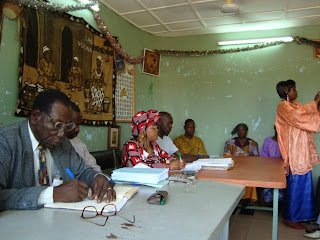 My first field trip came in handy, when I felt tired enough to happily leave the smoggy air, omniscent smell of gasoline and crazy traffic of Ouaga in the direction of WHEREVER. Nouna was the place. A town of about 50 000 inhabitants, a new born capital of an administrative region consisting of 100 villages connected through shabby roads that our guestkeeper crossed in a small ford fiesta campaigning for the office of the mayor.
My first field trip came in handy, when I felt tired enough to happily leave the smoggy air, omniscent smell of gasoline and crazy traffic of Ouaga in the direction of WHEREVER. Nouna was the place. A town of about 50 000 inhabitants, a new born capital of an administrative region consisting of 100 villages connected through shabby roads that our guestkeeper crossed in a small ford fiesta campaigning for the office of the mayor.Leaving the center of Ouaga throws you into a landscape full of small, lively, but extremely poor villages where whole families, including small children, work in the field with hardly any equipment. Malnutrition and more generally lack of food are as visible as it gets, on the big bellies of children and overall skinniness of people and cattle.

 250 km distance to Nouna consists of one half with high quality road with a toll, and the rest is an extremely bumpy sandy road where 20 kmh is often as fast as it gets. The good news is that the further you go and the bumpier the road gets, the more fertile the land. It gets greener and richer. Villages have more sophisticated architecture, with beautiful mud-brick granaries, the women and kids sell not only eggs but also pottery along the road.
250 km distance to Nouna consists of one half with high quality road with a toll, and the rest is an extremely bumpy sandy road where 20 kmh is often as fast as it gets. The good news is that the further you go and the bumpier the road gets, the more fertile the land. It gets greener and richer. Villages have more sophisticated architecture, with beautiful mud-brick granaries, the women and kids sell not only eggs but also pottery along the road.After 6 hours of dancing on the roads between villages we end up in the arms of Madame la Maire who in 2005 surprisingly and against a quite established personal planning of the biggest party won the run-off for the office in Nouna in the first local elections in Burkina. A strong African women, proudly wearing the traditional outfit and presenting her gender balanced team in the humble, but own town hall of Nouna. Was I the first Polish person in that village? It felt like that, so the surprise was even bigger when Madame la maire mentioned not only the Polish Pope (I am really sorry for the Germans, but I was reassured 100 times by Burkinabes that in their eyes the Pope remains the Polish John Paul II. So, although in the field of football Germany might dominate from time to time, Catholicism will remain a Polish domain.), but also Lech Walesa. Here the familiarity ended, and the door to an insight to African culture opened. An indescribable, fascinating and challenging experience from which I can offer only some dry pieces of information.

Some of the interesting issues:
- Hierarchy and formalities count a lot. That's why I believe there is a “chef-de-protocol” in the office of Mdm la maire.
- Hospitality and building informal relationships are the key. That's why I feel received as a friend with the tones of cordial interest directed towards the exotic newcomer.
- The meals are eaten together with hands from one big bowl or plate which, including the whole ceremony of hands cleaning around, it is quite an adventure for an Africa newcomer or even for the advanced who still doesn't master the technique of rolling the food into bullets with one hand without letting half of it fall.
- Dancing may be a part of your job contract if you have a boss that energetic and fond of dancing like Madame la maire.
- To the session of the region council, the representatives of villages walk for hours to get to Nouna and represent the whole variety of cultures present in the region, most recognizable for me – Christian and Moslem. The women, around 20 out of 100 village representatives, organize themselves in a mysterious way to sit all together in the back of the room and tend to be silent, with one exception and of course the gender balanced staff of Madame la maire.

Very hospitable, lively and talkative, Mdm la maire is a people's person. I can immediately imagine her driving through her villages and campaigning with little money and support but loads of energy and concern for her people. After the elections, she ended up with vast responsibilities, an incredible amount of passion and energy and extremely low budget which must suffice for the enormous needs of 100 villages. She still travels from village to village to

 explain to her voters why they should not hide children in fear of vaccinations, why to pay local taxes and why to build a non-koranic school in a Moslem village.
explain to her voters why they should not hide children in fear of vaccinations, why to pay local taxes and why to build a non-koranic school in a Moslem village.Madame la maire lives in a "big family" – a humble, small house with always lively courtyard where maybe 20 inhabitants share days and nights. She could rent a flat in Nouna, but nowhere she seems to be so much at home as in this big multiple generations household where her 95 year old mum, mother of 15, awaits her dozing, where her niece has a meal ready for unexpected guests, children sleeping in the



Keine Kommentare:
Kommentar veröffentlichen